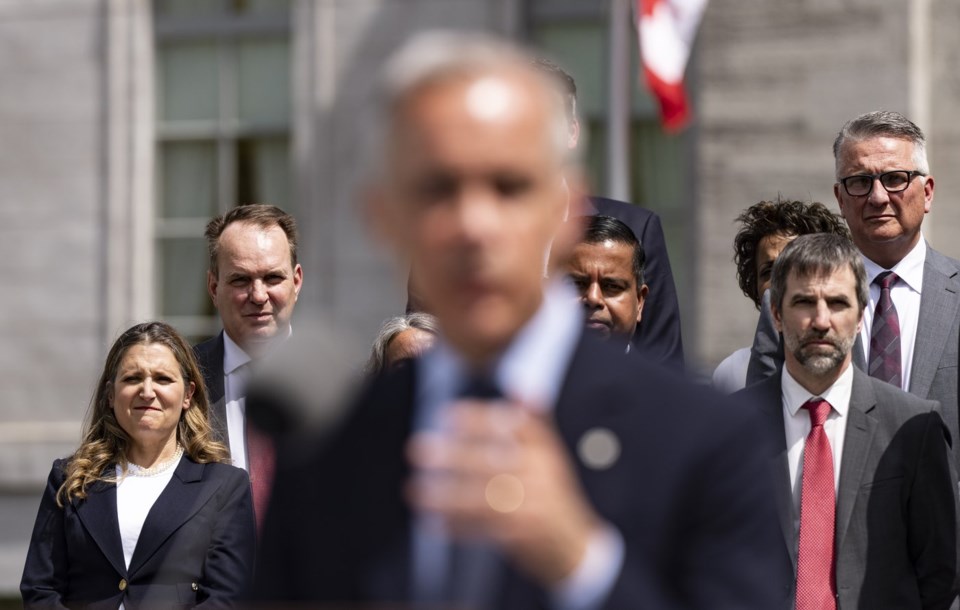OTTAWA — Liberal MPs voted against adopting a formal process to eject their leader should the need arise, newly elected Liberal Caucus Chair James Maloney confirmed on Sunday.
A majority of the caucus voted down a motion to adopt the rules set out under the decade-old Reform Act.
That law was originated by Conservative MP Michael Chong to embolden individual MPs to hold their party leaders to account by allowing them to force leadership reviews, among other things.
But Maloney refused to say anything more about the vote or the secret deliberations, insisting that should all remain private.
“The Reform Act was voted down,” Maloney said after the Liberals met for their first caucus meeting since the April 28 election. “What happens in caucus stays in caucus, and you’re going to hear me say that today, and tomorrow and every day going forward.”
The internal debate was prompted by Liberal MPs who were frustrated former leader Justin Trudeau was able to remain at the helm despite numerous calls from within caucus for him to step aside.
Adopting the Reform Act rules would have given Liberal MPs a road map for such situations. That's how the Conservatives ousted Erin O'Toole from the leadership after the Conservatives lost the 2021 election.
The rules let a fifth of the party's MPs move to trigger a leadership review. Then, a majority vote would be required to eject the leader.
Liberal MPs refused to talk about the outcome following their meeting on Sunday, but a few chimed in beforehand to share how they personally felt.
Whitby MP Ryan Turnbull said he had planned to support adopting the rules because it's "important to have caucus accountability in every party."
But Sault Ste. Marie—Algoma MP Terry Sheehan said he doesn't see the need for the new rules, which his party has never adopted.
"I've come in with a pre-set mind that I will not be supporting the Reform Act because we don't need to. Our caucus is strong," he said. "Behind those doors right there, that's our caucus and we can let our hair down any time and have frank and open discussions."
Prime Minister Mark Carney rallied his Liberal caucus Sunday afternoon with a speech that laid out his governing agenda for the re-opening of Parliament.
The Liberals briefly let the TV cameras and reporters into their first caucus meeting since winning the April 28 election to watch Carney address his new colleagues.
Carney said his government's immediate focus will be on affordability measures, such as quickly passing the tax cut he promised during the campaign.
From dealing with a chaotic White House to building up the economy, he set the stakes high for his new MPs.
"Our government has been elected to do nothing less than define a new economic and security relationship with the United States," he said. "Canadians also want their life to become more affordable. They want their communities safer. We will deliver these mandates with urgency and determination. We are going to get going from minute one."
Carney said his ministers will immediately introduce legislation to fast-track infrastructure projects deemed to be in the national interest and bring in a bill to eliminate all federal barriers to free trade in Canada.
Parliament returns on Monday to elect a new Speaker for the House of Commons, followed by a throne speech on Tuesday to be delivered by King Charles III.
Carney promised his government would move at a brisk pace with "one of the most busy returns to Parliament in Canadian history."
Parliament, however, is only scheduled to sit for a month before a pre-scheduled summer break until September, and the new government has not made time to table its budget until fall.
Still, Carney said his minority government team will be "very, very busy" in not just the coming weeks, but also over the next few years, and accomplish things "previously thought impossible at speeds not seen in generations."
The previous minority Parliament found itself gridlocked for months last year amid procedural obstructions, and the Trudeau government had largely failed to pass legislation or advance much of its agenda in its waning days in office.
Government House Leader Steven MacKinnon said he has spoken to the House leaders of all the opposition parties and is hoping for a reset in relations in the new Parliament.
"We are a minority government, so that obviously means that we need to attract support from all sides of the House to get anything done," he said. "At the same time, we believe very, very clearly that Canadians have given us a mandate, and I think it will be incumbent on all parties to respond to that mandate."
This report by The Canadian Press was first published May 25, 2025.
Kyle Duggan, The Canadian Press



